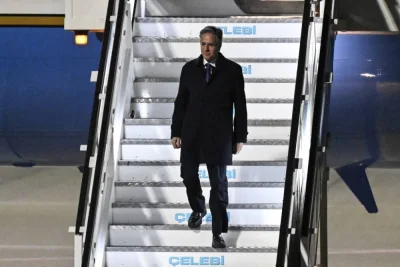- Lebanon’s Jama’a Islamiya says it also fired two volleys of rockets at a target in northern Israel
- EU foreign policy chief, in Beirut, warns against regional conflict
Lebanon’s Hezbollah group said on Saturday it had fired rockets at Israel and its arch-foe said it had retaliated, as top US and EU diplomats visited the region to seek ways to halt spillover from the war.
Shortly after rocket sirens sounded across northern Israel, the Israeli military said that “approximately 40 launches from Lebanon toward the area of Meron in northern Israel were identified”. There were no reports of casualties or damage.
US Secretary of State Antony Blinken and the European Union’s senior diplomat Josep Borrell were both in the region on separate diplomatic missions to stop the three-month-old Gaza war spilling over into Lebanon, the Israeli-occupied West Bank, and Red Sea shipping lanes.
Israel and Hezbollah often trade fire across the Lebanese border, the West Bank is seething with emotion and the Iran-aligned Houthis in Yemen seem determined to continue attacks on Red Sea shipping lanes until Israel stops bombarding Gaza.
Hezbollah said it had hit a key Israeli observation post with 62 rockets as a “preliminary response” to the killing of Hamas’ deputy chief Saleh al-Arouri on Tuesday.
Tensions have been especially high since Arouri was killed by a drone in the southern suburbs of Beirut, a stronghold of Hamas’ Lebanese ally Hezbollah, in an attack widely attributed to Israel.
Israel’s military said it had responded to the rocket attacks with an unmanned aerial vehicle (UAV) strike on “the terrorist cell responsible for the launches toward the area of Metula”.
Israeli fighter jets and troops also struck a series of Hezbollah targets in the areas of Ayta ash Shab, Yaroun, and Ramyeh in southern Lebanon, it said, hitting a launch post, military sites, and infrastructure.
Lebanon’s Jama’a Islamiya said later on Saturday it had also fired two volleys of rockets at Kiryat Shmona in northern Israel, in the third operation claimed by the group since Oct. 7.
Blinken was meeting the leaders of Turkey and Greece on Saturday at the start of a week-long trip that will also take him to Israel, the Israeli-occupied West Bank, Jordan, Qatar, the United Arab Emirates, Saudi Arabia and Egypt.
During two hours of talks in Istanbul, Blinken discussed the war and humanitarian crisis in Gaza with Turkey’s Foreign Minister Hakan Fidan, the Turkish foreign ministry said.
A US official said Blinken then held talks with Turkey’s President Tayyip Erdogan, a fierce critic of Israel’s military actions in Gaza.
Blinken also hopes to make progress during his tour on how Gaza could be governed.
After meeting the Lebanese foreign minister in Beirut, the EU’s senior diplomat Borrell expressed alarm about the exchange of fire between Israel and Hezbollah and said it was important that Lebanon not be dragged into the Gaza conflict.
“Diplomatic channels have to stay open. War is not the only option – it’s the worst option,” Borrell said, adding that he was also alarmed by increased violence by Israeli settlers in the West Bank.
Israeli offensive in Gaza has so far killed 22,722 people, according to Palestinian health officials, and devastated the densely populated enclave of 2.3 million people. At least 122 Palestinians have been killed and 256 others injured in Gaza in the past 24 hours alone, they said on Saturday.
The official Palestinian WAFA news agency reported on Saturday that 18 Palestinians were killed by an Israeli attack on a house east of the city of Khan Younis in southern Gaza.
In the West Bank village of Beit Rima, the Palestinian health ministry said a 17-year-old was shot dead by Israeli forces and four other people were injured.
The Palestinian Red Crescent reported heavy shelling in Khan Younis on Saturday near the Al-Amal Hospital. Shrapnel flew into the medical facility amid the sound of heavy gunfire from drones, it said in a post on social media platform X.
The traumatised residents of Gaza, most of whose population has been displaced by the bombardment, are facing a devastating humanitarian crisis, with food, medicine and fuel supplies running low.
Standing outside a morgue in Khan Younis on Saturday, 11-year-old Mahmoud Awad said his parents and siblings had been killed by Israeli airstrikes.
“We were in al-Shati refugee camp and they (Israeli army) dropped fliers saying that Gaza is a battlefield, so we fled to Khan Younis because it was a safe place, and they still bombed us,” he said.
 Kokani.me Kokani.me
Kokani.me Kokani.me


